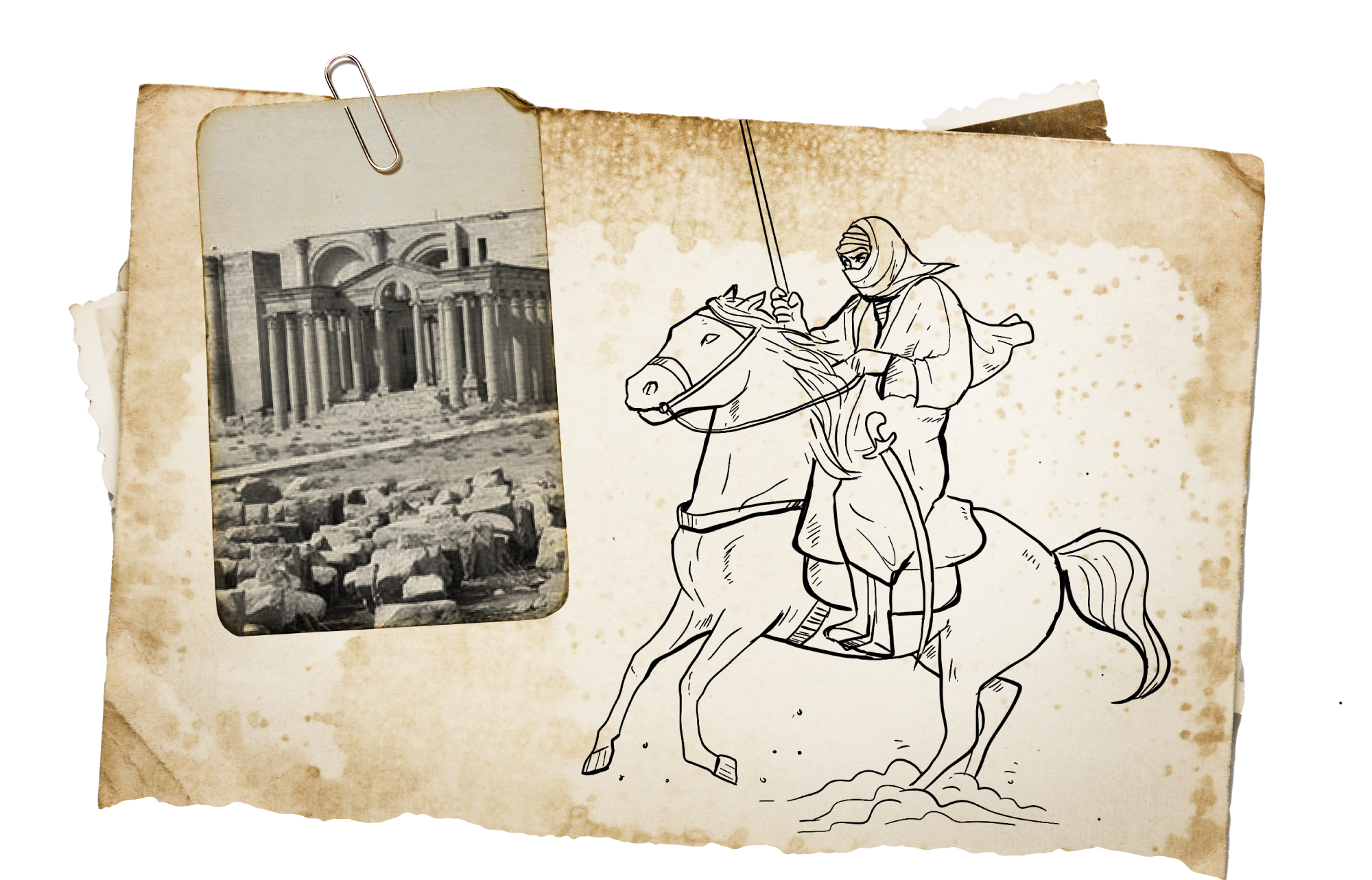
“Dhi Qar”
The Arab battle praised by poets and stored in Persian memory
The Kingdom of Al-Hira was one of the most important Arab kingdoms in the north of the Arabian Peninsula in the pre-Islamic era and played an important role in the civilization of the Arabs at that time. Historians trace its origins to the weakness period of the Parthian state and the beginnings of the Sassanid state, where the Persians were forced to allow the establishment of the Kingdom of Al-Hira after their inability to confront the Arabs of the desert. Thus, Al-Hira was an Arab kingdom that served as the barrier entity between the Arabs of the Arabian Peninsula and the Sassanid state, and at the same time, it played an important role during the conflict between the Persians and the Romans.
Al-Hira is located on the Euphrates River near the ruins of ancient Babylon. It was said that the Arabs called it Al-Hira as a metaphor for confusion and misguidance, but the closest to the accuracy is that the word Al-Hira comes from the Syriac language from the word “Harta” meaning monastery or fortress. Most of the inhabitants of Al-Hira are Arabs of Banu Tanukh and others who were known as the Allies (Al-Ahlaf) from the Arabs who emigrated and joined the residents of Al-Hira, as well as those who were known as “Banu Al-Obbad” who were the original inhabitants from the Christians.
Banu Al-Mundhir are considered the most famous Arab rulers of Al-Hira who influenced the internal politics of the Persian Empire, including what Al-Mundhir I (418-462AD) did when he supported Bahram in the dispute that erupted between him and the priests when he took the throne.
Despite this, the Persians were keen to extend their influence over Al-Hira and weaken its kings from Banu Al-Mundhir, who were the powerful kings whom Al-A’sha mentioned in his poetry and said:

Qubad tried to impose the Mazdakism religion on Al-Hira, but the Banu Al-Mundhir strongly rejected it. Here, the Persians resorted to the policy of cunning and inciting the Arabs against each other, so they incited Al-Harith, King of Kindah, against Banu Al-Mundhir.
The great tragedy occurred in the era of Al-Nu’man Ibn Al-Mundhir, who was described as being magnanimous and brave and who restored Christianity to rule. Al-Nu’man converted to Christianity on the Nestorian doctrine, and Al-Hira became one of the most important strongholds for the protection of this doctrine, to the extent that the Catholicos Isho yhab I (582-595AD) resorted to Al-Hira itself.
As a result of political disputes, a dispute arose between Al-Nu’man and Khosrau. There are various opinions about the reasons for this dispute. Some see that the reason was the Persians’ anger at Al-Nu’man’s conversion to Christianity, which was the religion of their Roman enemies, while others believe that the reason was the Persians’ fear of the increasing strength of Al-Nu’man as a result of his alliances with many Arab tribes, and this was against the Persian policy that was based on the principle of “divide and rule”.
On the other hand, some attribute the Persians’ betrayal of Al-Nu’man for personal reasons, as Khosrau asked Al-Nu’man for an Arab horse, but he refused to give up his horse because it was an Arab, so Khosrau was angry at him. Others believe that the reason for the dispute was Khosrau’s greed for women, as someone said to Khosrau: “Al-Hira has women who possess all the qualities of beauty. If you send to Al-Nu’man, he will send you one of them”. It was said that Khosrau requested Hind, the daughter of Al-Nu’man, for himself.
At all events, Al-Nu’man refused Khosrau’s request with the pride of the Arab man. Here, Khosrau became angry at him. In our opinion, whatever the reasons, the real motive for Khosrau ‘s betrayal of Al-Nu’man is the desire of the Persians to take direct control of Al-Hira and its wealth.
Khosrau played a game of cunning with Al-Nu’man Ibn Al-Mundhir, as he summoned him to Al-Mada’in. Al-Nu’man felt treachery, so he sent his women and what he owned to Hani Ibn Masoud, the head of the Bakr Ibn Wael tribe, to be safe with him. There are different accounts about the fate of Al-Nu’man in Al-Mada’in and how Khosrau betrayed him after he gave him safety. Some believe that he was killed by poison, and it was said that Al-Nu’man continued in the prison until he died.
Khosrau was not satisfied with his betrayal of Al-Nu’man, but he sent to Hani asking him to send what Al-Nu’man had left with him, and Hani refused his request in order to preserve his covenant with Al-Nu’man and out of respect for Arab dignity.
Bakr Ibn Wael tribe humiliated Khosrau before Islam and changed the strategy of direct war to war by proxy to this day.

These facts formed the beginning of the famous historical battle of Dhi Qar. In this battle, the Persians and the Arabs loyal to them were defeated, and the Arab alliance was victorious. Dhi Qar became one of the most important immortal days in the ancient history of the Arabs. The Arab poet Abu Tammam praised the victory of the Arabs over the Persians, saying:
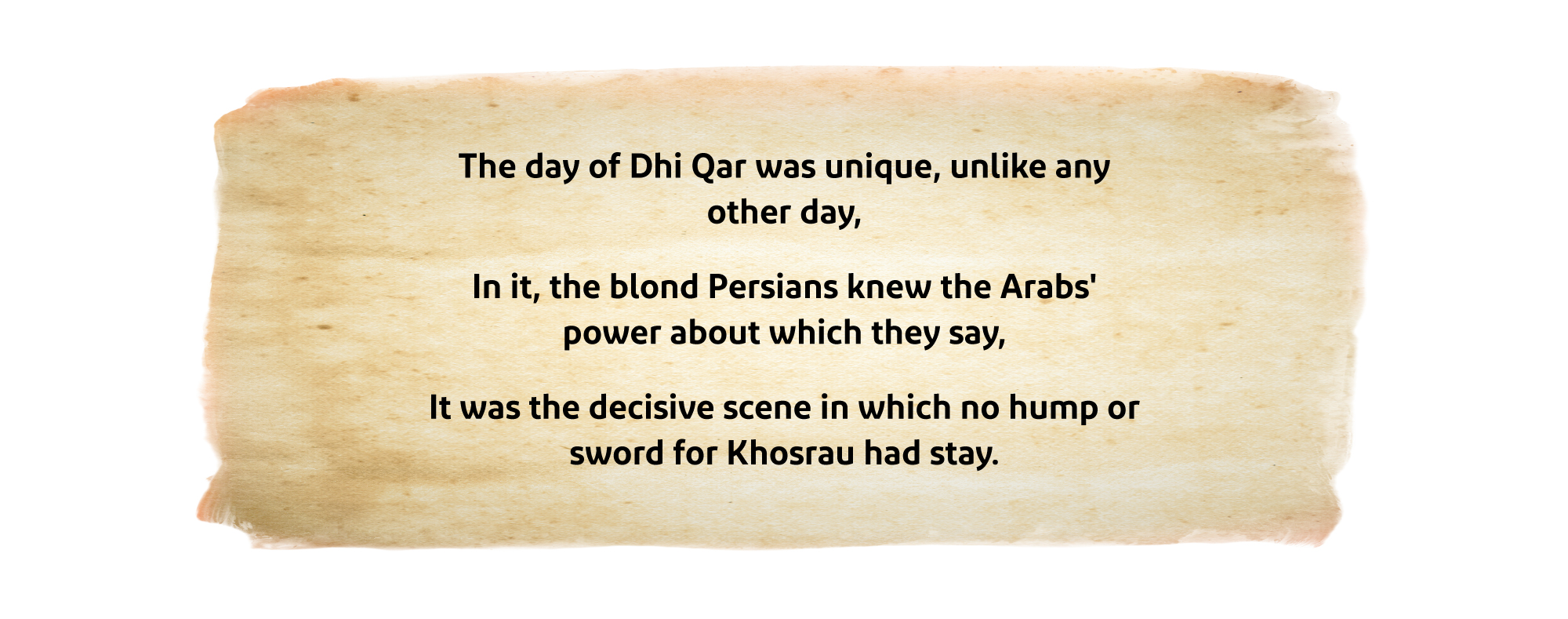


- Jurji Zeidan: Ghassan’s Girl (Cairo: Hindawy Foundation, 2012).
- Shaima Al-Samarrai, The Relationship between the Kingdom of Al-Hira and the Tribes of Najd and Eastern Arabia before Islam, Master Thesis, Tikrit University, Iraq (2009).
- Abd Al-Wahhab Azzam, The Links between Arabs and Persians and Their literature in Pre-Islamic Times and Islam (Cairo: Hindawy Foundation, 2012).
- Ali Al-Baghdadi, History of the Kings of Al-Hira (Cairo: Salafi Press, 1920).
- Muhammad Mabrouk, The Pre-Islamic Era (Cairo: Hindawy Foundation, 2017).
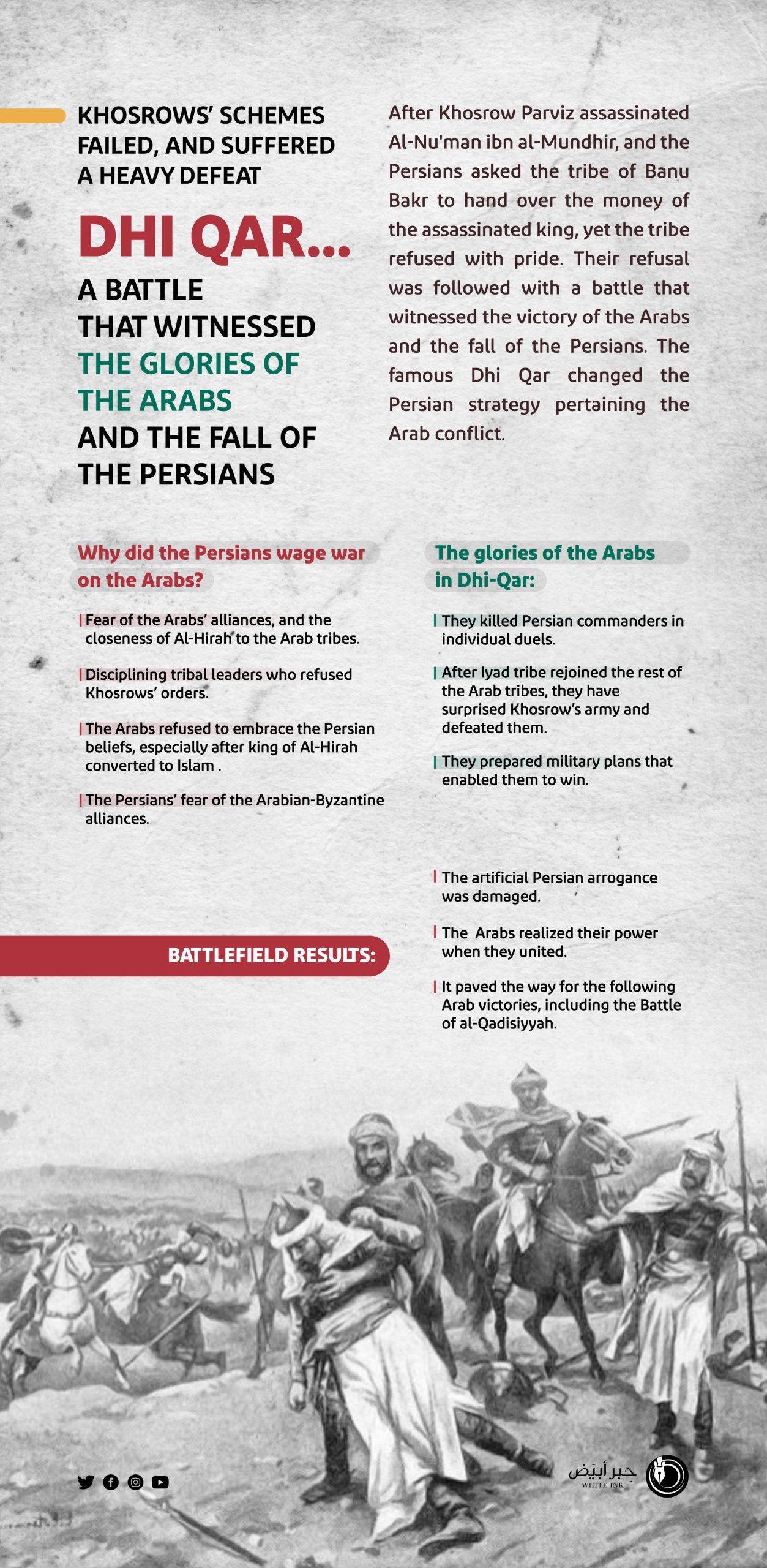
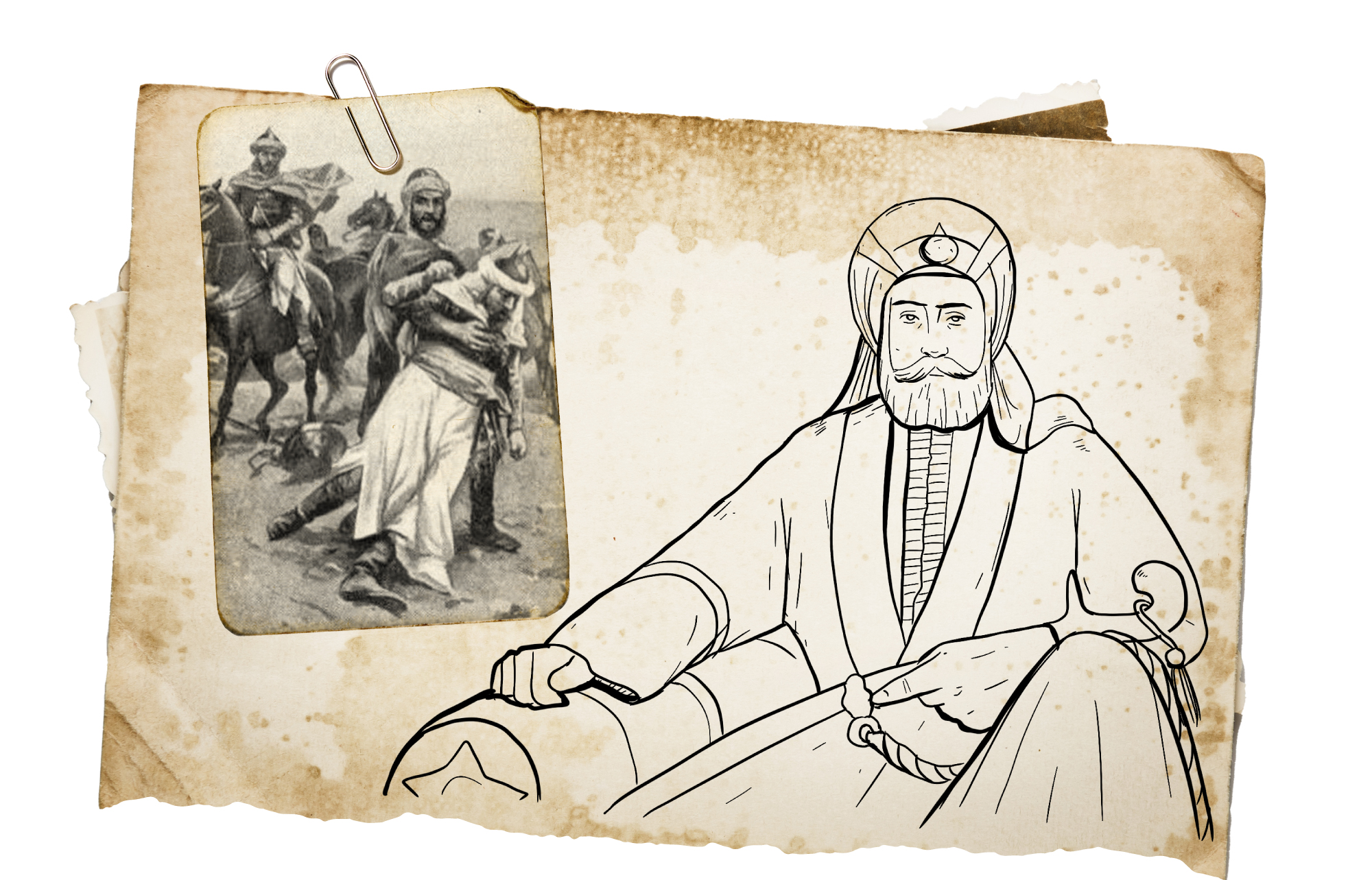
They killed their leaders and knights; and taught them a lesson of dignity as well
“Dhi Qar”... The Day on Which Arabs United and Made the Persian Arrogance Feel the pain of Defeat
Since the dawn of history, Arabs have been plagued by the neighborhood of Persians up to this present day. Arabs fought battles and wars against them since ancient times. Although Persians adopted Islam, they borne inherited rage, hatred, and racism towards any Arabic thing, especially after Caliph Umar Ibn Al- Khattab, may God be pleased with him, had destructed their last political stronghold after Al- Qadisiyah battle (636) which became a source of hatred towards Arabs in the Persian collective mind (of Persian people).
In addition to Al- Qadisiyah, Persians had historical accumulations, before adopting Islam, against Arabs. The famous Dhi Qar battle during the Pre- Islamic period was one of the most important battles between Arabs and Persians. It is well known in Pre- Islamic history that Arab Kingdoms and tribes had political loyalty to Persians, the most prominent of which would be the Kingdom of Al- Hirah whose first kings was Malik bin Fahm Al- Abrash, and his son Jadhima Al- Abrash; then, Amr bin Adi, and also Al- Nu’aman who built Al- Khornaq and Al- Sudair palaces, his son Al- Mundhir, then, Al- Nu’aman bin Al- Mundhir, the last king of Lakhm tribe.
One of the most important causes of the famous Dhi Qar battle in the Pre- Islamic history of Arabs was that Khosrow demanded the inheritance of Al- Nu’aman bin Al-Mundhir, but Iyas ibn Qabisa told him that it was a lodgment at the tribe of Bakr bin Wa’il (Banu Bakr). Khosrow ordered him to give it to him. Thus, Iyas sent to Hani bin Masoud Al- Shaibani ordering him to give him back the lodgment of Al- Nu’aman including his money, shields, and everything belonged to him even his women. Their number, as mentioned by historians, was eight hundred shields, while some said they were seven thousand shields. Hani bin Masoud refrained and refused to give the lodgment entrusted to him by Al- Nu’aman bin Al- Mundhir. Khosrow Parviz became angry and threatened to eliminate Bakr bin Wa’il. Therefore, Al-Nu’man bin Zara’a Al-Taghlabi, who hated Banu Bakr and sought to destroy them due to Al- Basous war, advised him to grant Banu Bakr a respite until summer, then, they would rush to get water from “Dhi Qar” well. They would rapidly fall one after another, then, Khosrow would sieze them. When the temperature of Banu Bakr area had become very hot, and they had felt blistering heat, they went to Dhi Qar area. Khosrow sent them Al-Nu’man bin Zara’a giving them three choices: either to surrender to Khosrow so that he would deal with them, as he desired, to depart, or to start war.
Having only those oppressive and unjust choices for Banu Bakr, Hanzala bin Tha’labah bin Sayar Al- Ajli advised his people to fight the war against the Persians because if they surrender, they would get killed while their offspring and their women would be taken captive; if they departed, they would die of thirst and their enemy would follow them to eradicate them. At that time, Khosrow sent them the Persian army led by Hamzer Tustri, the great satrap of Khosrow, leading one thousand Persians; in addition to Jalabazin, for whom Bariq Obelisk was built, leading a thousand horsemen. Iyas ibn Qabisa went to the battle leading Al- Shahba and Al- Dawsir, who were two battalions that Persian kings made a military force affiliated to Al- Manathera: Al- Shahba men were Persians while Al- Dawsir men were Tanukhi Arabs in particular accompanied with Khalid bin Yazid Al-Bahrani leading Al- Bahra’ and Iyad tribes. In addition, Al- Nu’man bin Zara’a Al-Taghlabi went leading Taghlab. Al- Nimr bin Qasit, Qais bin Masoud bin Qais Dhi Al-Jeddin, and one of Khosrow’s governors and satraps of Safwan went as well.
Khosrow ordered that these armies shall be led by Iyas ibn Qabisa and shall assemble under his brigade. When Persian armies came, Qais bin Masoud bin Qais Dhi Al-Jeddin infiltrate into the camp of Hani bin Masoud, and advised him to distribute the weapons of Al- Nu’man to his tribe in order to be armed, then, they would return them to him. He heeded his advice and divided shields and weapons to those who had strength and patience of his people. When the armies of Iyas ibn Qabisa Al- Ta’i approached, Hani feared the defeat, as they were not able to fight Khosrow’s armies and the Arabs who joined them.
Hanzala bin Tha’labah bin Sayar Al- Ajli felt sorry to see the Arabs fleeing from the Persians and their armies. He stood still before Hani and said, “You only wanted to rescue us, but all you did is that you brought us to devastation”. He made people return so he dismembered the animals that were driving caravans so that Banu Bakr would not drive their women if they fled. He started dismembering the animal of his wife’s caravan, then, he continued so that it would be impossible for the women to flee riding camels if men fled. He shouted: let each of you know that if any of you flee, he would give his wife to be a captive. Fight between too close ends either victory or death. Take the initiation to be forceful before your enemy so that you would intensify fighting against the enemy. Then, he made an awning “tent” for himself in Dhi Qar plain, and swore not to return.
Khosrow armies marched carrying the most powerful and plentiful equipment. Then, Hani bin Masoud Al- Shaibani rose, as he became convinced of the fighting necessity. He sent words implying wisdom composure saying, that caution does not stop fate and patience is a victory method. We may die but never live with disgrace. After that, women voices rose up prompting to have courage and bravery. An Ajli woman shouted:

When the Persian army approached with elephants, one of the Persians came out and challenged the Arabs to a duel. It did not take long until an Arab knight confronted him and snapped his neck. Hammers became angry and went himself challenging to duel. An Arab knight, called Al- Hofzan, confronted him and killed him. Persian army was shocked so some people walked away but most of them returned. They drew water for half a month. Then, Persians came to them and fought them at the well area until Persians were dying of thirst so they fled but Arabs followed them and killed them. When the thirst of Persians have become very severe, they went to Dhi Qar plain. Some Arabs who were with Persians pined for their people so they intended to join them, who were Iyad tribe that was with the Persian army. Iyad people were valiant and defeated Persians many times. Before Iyad people joined the Persians as mercenaries, they sent to Banu Bakr asking: Which is better for you, joining you at once or waiting for the intensification of the battle, then, we would move to your side? Banu Bakr replied: we would rather you move in the midst of the battle as it would be more weakening and shocking to the enemy.
Iyad tribe retreated from supporting the Persians in Dhi Qar, and their zeal turned the battle scales in favor of the Arabs.

When both sides encountered in the battle Banu Iyad joined Banu Bakr during the heat of the battle. Persians could not keep pace with the Arabs so they were defeated by Arabs for the first time. That was an incentive that rose the self- confidence of the Arab tribes and emboldened them to confront the Persians. Thus, Dhi Qar battle was a surprise to Persians, as it was a surprise to the Arabs themselves.
Al- Tabari mentioned in one of his Dhi Qar narrations: “That people deliberated (as they demanded that one become their commander). They made Hanzala bin Tha’labah bin Sayar Al- Ajli their commander as they regarded him as a good man. He said to them, I see nothing but war. They obeyed his order and he took charge of the fighting. He led his people “Banu Ijl” during that fight so he had the largest share of it”.
Hanzala took the position of Hani bin Qabisa bin Hani bin Masoud, the head of Banu Bakr during the battle that took place in Dhi Qar where the well (hole) was located. Hani was urging hearts to fight during the attack on the Persians on the day of Dhi Qar well, surrounded on his right by Yazid bin Mashar Al-Shaibani, and Hanzala bin Tha’labah bin Sayar Al- Ajli was on his left protecting him from any side attack from his left.
As for Yazid Al- Sakuni, who was an ally of Banu Shayban, he ambushed with his people from Banu Shayban in a place in Dhi Qar. When Iyas ibn Qabisa came with the Persians to that place, he went with people who were with him in a sudden attack on Iyas and his followers. Iyad left in defeat. Thus, he hugely helped to defeat the Persians.
Some historians said that the main war was fought against Banu Shayban and the war commander was Hani bin Masoud while Hanzala was the mastermind. However, after studying the various narrations, it becomes clear that Hanzala had a more important and greater role in the fighting than Hani. Some narrations even mentioned that he managed the fighting after Hani; people made him in charge after Hani in the battle of “Dhi Qar well”; it was him who killed “Jalabazin”; and that “Ijl battalion” did a great job in that battle until it ended with the defeat of the Persians.
Banu Bakr seized most of the Persians at Iyas ibn Qabisa and captured their money. Women exchanged presents of musk on trays of gold and silver. That battle was a great victory for the Arabs, during which Khosrow and his people suffered adversities. Arab poets competed to commemorate the great victory within poems bearing witness to the wonders that the Arabs would do if they united.


- Jurji Zaydan: The Girl of Ghassan (Cairo: Hindawi Foundation, 2012).
- Jawad Ali, Commentary on the History of the Arabs before Islam, 2nd edition (Baghdad: University of Baghdad, 1993).
- Abd Al- Wahhab Azzam, The links between the Arabs and the Persians and their Etiquette in the Pre- Islamic Era and Islam (Cairo: Hindawi Foundation, 2012).
- Muhammad Al- Tabari, The History of the Prophets and Kings, investigation: Muhammad Abu Al- Fadl Ibrahim (Cairo: Dar Al- Maaref Press, 1968).
- Abdel Aziz Salem, The History of the Arabs in the pre- Islamic Era (Tarikh Al- Arab fi Asr Al- Jahilya) (Beirut: Dar Al- Nahda Al- Arabiya for Printing and Publishing, n.d.).
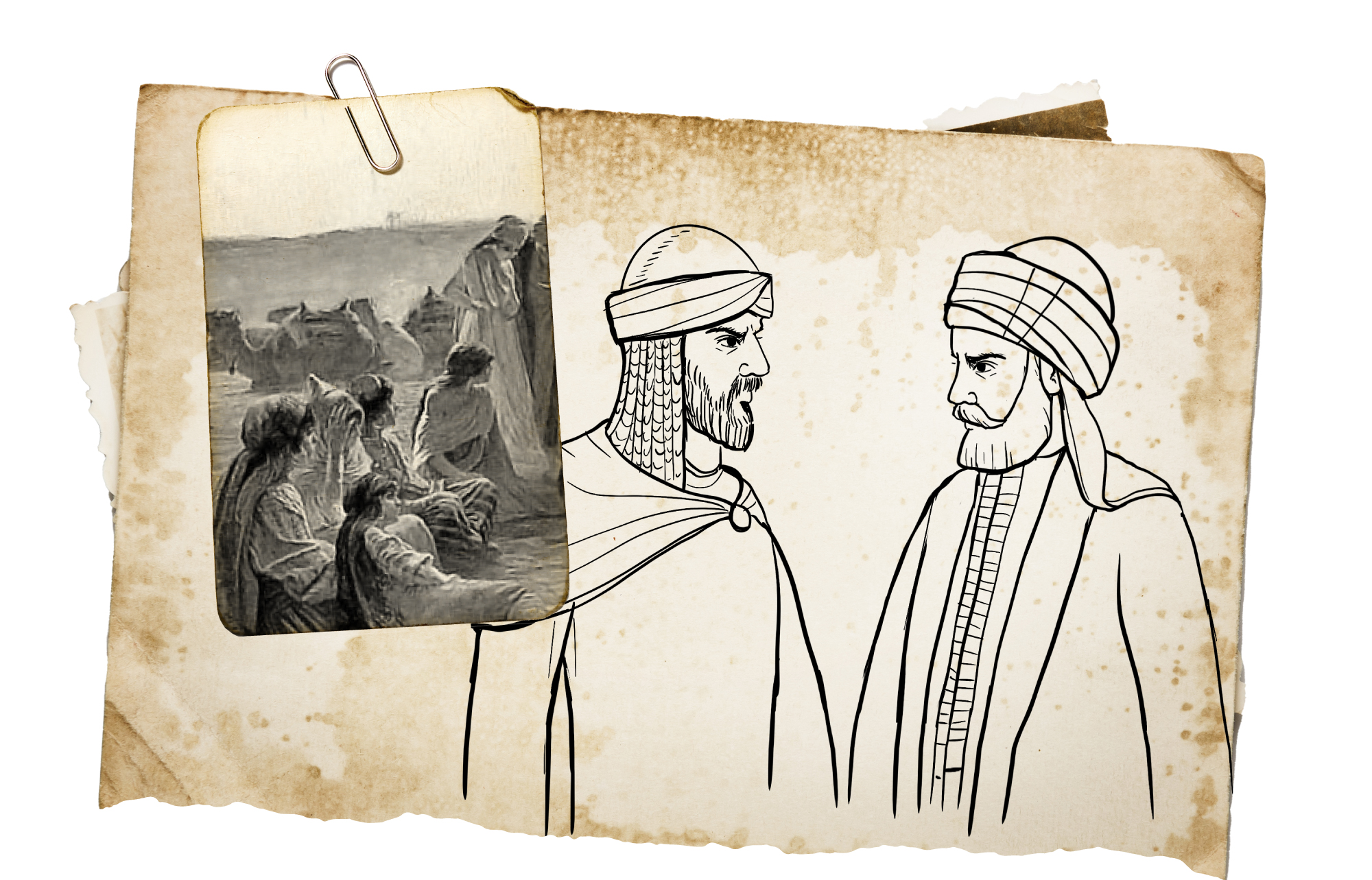
In the Battle of Dhi Qar
The Arabs refused affiliation and tore up the dream map of Persian geography
The study of the history of the Persians or any phenomenon extended in history and continuing in the present remains a basic entry point for understanding the superior ethnic structure of the Persians towards the Arabs and an indispensable prelude to dismantling the doctrine of malice and hatred that has been entrenched in the collective unconsciousness of the Persian rulers of Iran.
In this context, one of the disadvantages of geography is that it has placed the Arabs next to an ethnic political entity that abandons the philosophy and spirit of the state in order to adopt an expansionist arrogant ideology filled with feelings of hatred, enslavement, murder and terrorism. If the confrontations between the Arabs and the Persians were ups and downs between the two sides, then the Arabs formed bright images of resistance to the Persian malice and hatred, so that the Battle of Dhi Qar was one of these images that became part of the history of both the Arabs and the Persians.
Historians have not definitively explained the reasons for the Battle of Dhi Qar, although there was agreement on its end and results. If some believe that the direct reason of the battle was Khosrau’s request to the king of Al-Hira, Al-Nu’man Ibn Al-Mundhir, through his messenger, Zaid Ibn Odai, to send some of his girls, but he refused to fulfill his desire, then we believe that the matter went beyond fighting to get a girl or booty to an attempt to subdue the Arab tribes that aspire to independence from the Persians.
In this regard, it is possible to monitor some aspects of the clash between Al-Nu’man and Khosrau, which were embodied by a number of situations. Here, we note that Khosrau had previously attacked Al-Nu’man, the king of al-Hira, accusing him of refusing to accompany him to the country of the Romans when he was fleeing for fear of Bahram Gubin.
This argument is strengthened by the narration of one of the Russian orientalists who dealt with the attempts of Al-Nu’man’s independence from Khosrau. She says: “The king of Al-Hira revealed his independence in his relations with the King of Persia. In the days of Khosrau’s ordeal when he fled from Bahram, Al-Nu’man did not help him and did not go with him. It is also said that Al-Nu’man refused to give Khosrau an Arab horse which he had requested”.
Perhaps these reasons explaining the hostility of Khosrau to Al-Nu’man have been removed from the minds of historians in return for focusing on one of the reasons that accumulated for the outbreak of the Battle of Dhi Qar, which is the desire of Khosrau in one of Al-Nu’man’s girls on the grounds that their beauty is similar to what Khosrau read in one of the documents according to the intrigue of Zaid Ibn Odai, who he wanted to take revenge on Al-Nu’man, who had killed his father.
Narratives intersect on Al-Nu’man’s refusal of Khosrau’s request. He replied to him saying: “Did the king not find in the cows of Iraq and Persia what would satisfy his needs?”. Because of this refusal, Khosrau ordered Al-Nu’man to come to him. After several attempts to obtain the support of the Arab tribes, Al-Nu’man responded to the order of the ruler of Persia on the advice of Hani Ibn Masoud, the head of the Banu Shayban tribe.
Khosrau’s insistence on subjugating the Arab tribes despite getting rid of Al-Nu’man proves that the preludes to the conflict between him and Ibn Al-Mundhir were nothing but false reasons to achieve the political goal of conquering the Arabs. It seems that the king of the Persians had consulted on the issue of the invasion of Bakr Ibn Wael tribe, and someone advised him to wait for the summer, when the Arabs suffer from a lack of water and usually head to the place of Dhi Qar. It seems that Khosrau was convinced of the advice and arranged the matter for its implementation.
Without detailing the reasons of the battle that was scattered in the history books, the pride of the Arabs, their refusal to submit to the rule of the Persians, and their deep knowledge of the Persian ethnic creed prompted them to choose to fight and not accept the humiliating conditions of the messengers of Khosrau.
Thanks to the unity, the originality of the race, and the repentance of the Arabs who were supporting the Persian army, then their success in striking the center of the enemy’s power represented in the heads of his army in individual confrontations, the Arabs were able to win this decisive battle.
After the Battle of Dhi Qar, the Arabs realized their true strength when they united to deter the Persian ethnic ambitions.



- Hassan Al-Jaf, Political History of Iran (Beirut: Arab Encyclopedia House, 2008).
- Raif Khoury, With the Arabs in History and Legend (Cairo: Hindawy Foundation, 2019).
- Abdel Aziz Salem, History of the Arabs in the Pre-Islamic Era (Beirut: Dar Al-Nahda Al-Arabiya for Printing and Publishing).
- Muhammad al-Tabari, History of the Prophets and Kings, investigated by: Muhammad Abu Al-Fadl Ibrahim (Cairo: Dar Al-Maaref, 1968).
- Nina Victor, The Arabs on the Borders of Byzantium and Iran (Moscow: National Council for Culture, Arts and Letters 1964).




